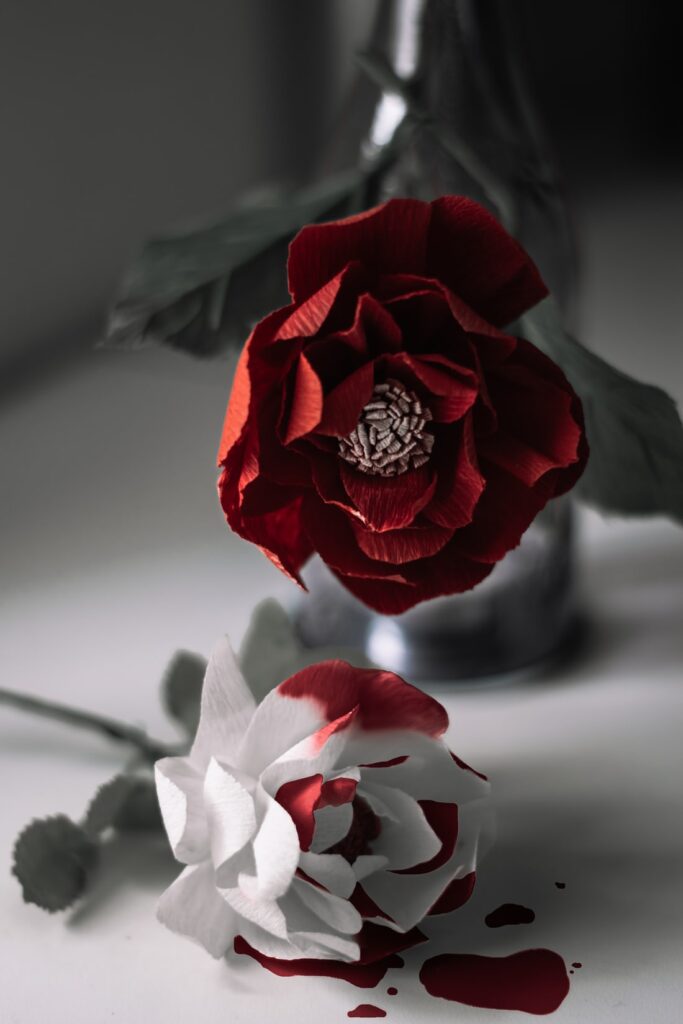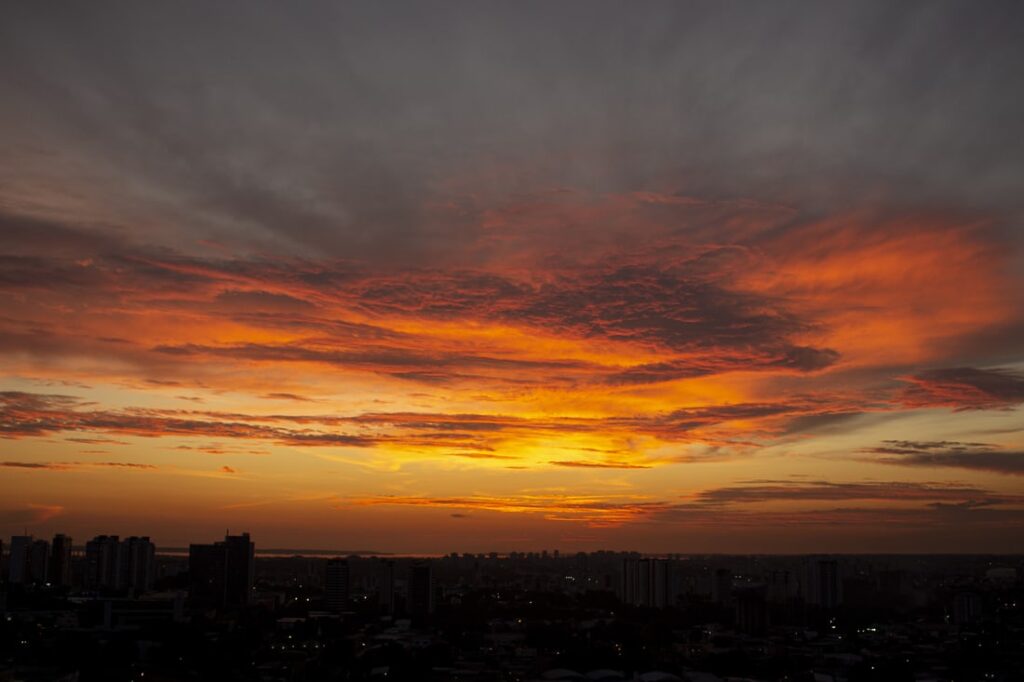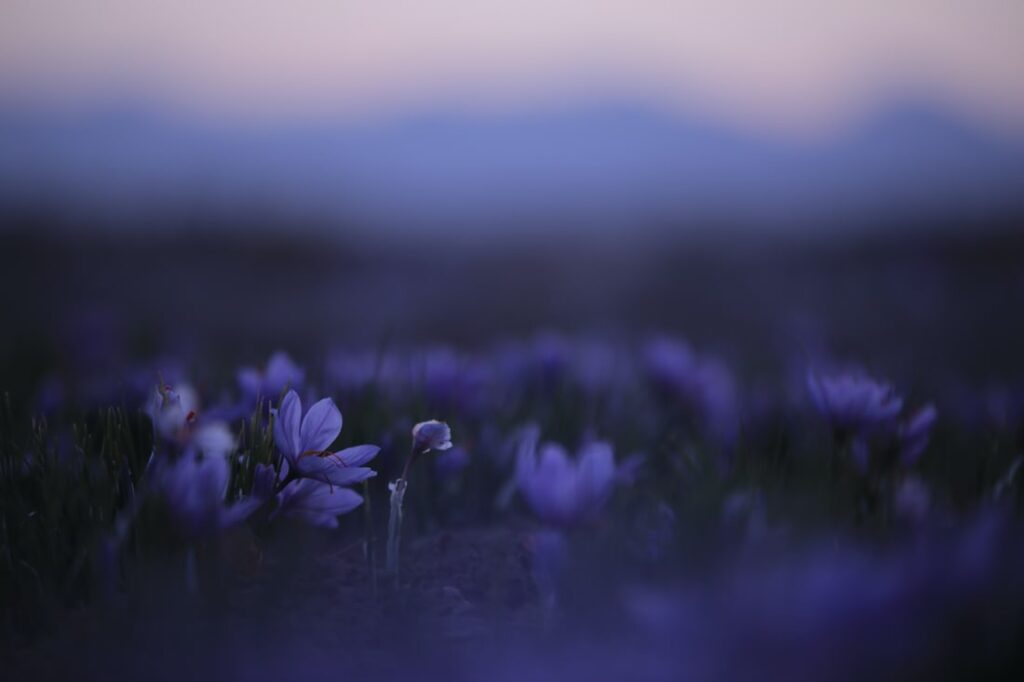
He has heard that the valley used to be a rich tapestry. Greens and pinks, blues and yellows, saffrons and purples all found a place in it. Rich and vibrant. Scintillating and soothing, tempestuous and tantalizing. Warp and weft. Woven into the rich rugs and carpets for which the valley is famous.
The luster has faded over the past three decades. Now, only a few colors remain. Spreading unchecked over the entire land and tainting it. They are red and green, red always following where green leads.
“Colors are God’s gift to us”, drones the teacher. The children in high school name primary and secondary colors and paint them in their books. “But black and white teach us life”, this teacher is clearly a philosopher. “White is the most selfless, reflecting all, giving everything to the world. That is why it is associated with purity. Black swallows everything. That is why it is the most selfish”, the children listen, most of them half asleep. One student decides to impart this valuable nugget of information to his know-it-all, thinker of a younger brother and score one over him when the chance arises.
In the younger class where the thinker studies, another teacher is explaining the importance of the three predominant colors of the national flag. Saffron for sacrifice, white for peace and green for prosperity. Then what does blue stand for? wonders the thinker who sits by the window, eyes on the distant peaks, until the chalk thrown by the exasperated teacher catches him square on the forehead.
The thinker thinks he knows better. Pretending to be asleep, huddled under his blanket in the bitter cold of the night, he listens to the family elders talking around the fire whose dull saffron glow brings warmth and comfort, the air redolent with the smoky smell of walnut and deodar. Not that many elders remain, but those who do often talk with a strange wistfulness. He has heard them ascribe the colors of the flag to the people in the village, saffron for the ‘tika’ bearers, green for the skull-cap wearers and white for the strangers who wear a small cross. But he has always fallen asleep before he hears about the blue. Maybe it is the stragglers who live at the edge of the village, embraced by none and shunned by all.
Huddled under his blanket, he has heard stories with strange words in them which he does not understand, “Ralive, Tsalive ya Galiv”(convert, leave or perish), “violated”, which is what happened to his grandmother and aunt and “tortured” which happened to his grandfather and uncles. But he knows better than to ask their meaning, for his father’s face will cloud over and his mother will make her displeasure known with that click of her tongue at his impertinence at raking up old memories, like picking on a festering scab.
His father who escaped by the skin of his teeth has only recently wended his painful way back to a house in ruins and back-breaking labor. His mother walks twelve miles along the Vitasta every day to work in a silk-mill in the big town. She hums to herself along the way. She is a font of optimism, his mother, just like his older brother who takes life as it comes. They are simple folk. Truth be told, they think of him as rather strange, with his ponderings and musings and asking strange questions. But his father understands. And pats him on the head, telling him that he takes after his uncle. “He was a great one for questions,” he says. “Used to go to college in the big town.”
Those days are long past. A hazy memory, like a water color which has been wiped over by a soaking-wet sponge. But, the sponge in this case was wet with blood, not water.
The green of the valley now flutters from houses and places of prayer with onion shaped domes. And the olive-green fatigues of the protectors who march past in thick-soled boots, belts of bullets at their waists and guns over their shoulders. The protectors and the protected are wary of each other. And the skull-cap wearing protected take to pelting stones at them, every chance they get. ‘Thud, Thud, Thud’ sounding like the clothes which his mother beats clean on the flat stones on the banks of the Vitasta.
Red instead of being comfortingly warm causes him to break out into a cold sweat, because it is the color of blood, which flows from the protectors, from the tika bearers and sometimes from the perpetrators whom his father calls ‘terrorists’ in a hushed tone and who are hailed as the ‘liberators’ by most of the boys in his school. He has asked his father the meaning of this strange new word, drawing a deep frown of concern and a lesson in geography and history about how his land, his slice of heaven on earth was torn asunder because of a weak king, ruthless mercenaries and a political blunder by ‘Uncle’ in a far- off city. A series of such successively weak uncles and strange laws, his father says, have made refugees of them in their own home.

It is the age- old story of industry versus lethargy, the haves versus the have-nots, further tainted with the brush of religion. Some, who have launched a ‘holy war’ against anyone who does not fall in line with their philosophy. “But isn’t killing wrong?” he asks, his innocence and youth peeping through the thin veneer of grown-up sophistication, “I have seen the same red flow from all the bodies”. “Not everyone thinks like you” his father replies with a sad shake of his head. “And they hate us for not believing in the One true God. For being the haves in the old days. In their book, we are the infidels, not worthy of being equals” This makes him ponder more, is he hated for not believing or having? Not that he has anything now. And what is equal?
The few colors which make him feel at peace is the purple of the crocuses which grow for miles around from September to November, and the red-gold of their picked stamens which is what his father does, hours of back-breaking labor to pick this precious spice by hand before sorting it for packaging and exporting which is declared with great fanfare as the ‘back-bone of the economy’.
“We had a shop here once, dealt in the best saffron”, his father declares one day, voice full of pride at this golden remnant of the past. And so, the thinker learns to take comfort in saffron, the color of the top third of the flag, the color of his father’s pride and toil.
*******************
Today his teacher is talking about the rights guaranteed in ‘The Constitution’. “We are all equal in the eyes of the law”, he declares with a conviction that the thinker does not feel. And he wonders if he should repeat what his father told him a few days ago, but decides against it.
Though the adults do not realize, he can read well and tries to understand for himself. He finds it strange that some are treated better than others in this land of equality. And he craves to know the fundamental reason why. But he dares not ask his teacher for fear of being targeted with the chalk or worse. His teacher sneers at him, ridicules him for being a ‘Tika Bearer’ often enough. And this is fodder for most of the boys in his class to abuse him too. Thus, he keeps to himself, unlike his older brother who is better liked for his ability to take the abuse more unquestioningly.
Life in the saffron bowl of the country is indeed a difficult place to swear your allegiance to the color which gives it name and fame.
He wakes up terrified one night, the heavy front door under assault, the thud of sticks and stones against it making him wonder if he is the next target for a hailstorm of stones. His father leads them out of the back door and hurries them along a small path with the Vitasta, swollen after the rains roaring along the left. The light cast by the half moon is dim and fitful. The wind cold and menacing. He is not allowed respite. Doggedly his father makes them all put one foot in front of the other. Shivering under his pheran, he does his father’s bidding. Their lives depend on it. They make it to a small protector camp on the outskirts of the big town and stay there for a few days.
News trickles through. A soft-spoken school teacher’s son has been killed by the protectors. Thousands attend his funeral. The protectors themselves require protection. A young protector whom he befriends looks at him with sad eyes, “Don’t always believe the written word. It could have been scratched out in the mud by vultures”, he says. “This teacher’s son wielded a large gun. He killed many, even some of his own brethren. Never believe all that the vultures say”. He nods. He has seen this school teacher’s son in his village at night sometimes, carrying a large gun over his shoulder, accepting the adulation of some fawning villagers.
For days, newspapers carry the picture of this schoolteacher’s son, each eulogy vying with the next for length picturing him as a blameless innocent, innately peaceful, driven to violence by the injustice to the color of his choosing and the ‘system’. He thinks of his older brother, only a couple of years younger than the dead man, toiling with his father in the purple saffron fields and wonders whether the injustice which has been their cross to bear since birth will make a merchant of death of him too.
He fears it might and after many sleepless nights, plucks up the courage to ask his father one day. “No”, says his father. “If we wanted to pick up guns and grenades, we would have done it when we were driven from our land many years ago”. He wants to be reassured by his father’s words, but does not know in whom to repose his beliefs anymore.
A few years pass. His brother works in the big town now. He has replaced his brother in the saffron fields. He helps pick the swathes of purple flowers before sorting the stamens by hand. It is a strangely calming repetitive exercise. The fields themselves are repetitive to nature’s rhythm, flowering year after year with a soothing regularity. They are the constant in his everchanging world.
**************
The new ‘Uncle’ who has taken over in the distant big city is now trying to keep his promises of bringing changes to the valley. The thudding of the protectors strong soled shoes seems surer now, while that of the stones have lost their regularity and their vigor. Crowds do turn up, but they seem cowed. The old belligerence is gone. He wonders if he should allow himself a hint of an occasional smile.
Uncle in the meantime it seems practices wicked yoga moves, drives away poor starving succor seeking refugees in droves, has banned ‘keema everything’ and has sweet-talked carrot goons into killing the skull cap wearing true loves of girls in black bindis for not wearing an orange bandana in place of their skull caps. The skull-cap wearer’s killing makes it to the headlines and stays there for days.
He is reminded of his friend from the neighboring village, slaughtered for wearing a saffron bandana. He wonders why nothing is said about this and puts it down to the new definition of equality. A warped world where crimes can be condoned on the whims of those who control narrative and where outrage is selective. He feels sad that even Uncle does little about this.
He thinks that the saffron fields appear happier. Their yield certainly seems to have increased. He finds himself humming like his mother on occasion, especially while harvesting the crocuses. An old picture which he has seen hanging in a big shop in the big town often comes to his mind. It shows people at work in the saffron fields and is rather unimaginatively titled ‘The Gathering of Saffron’. He hopes he resembles one of the chubby, fair, happy looking workers in the picture.
Uncle in the meantime has many other tricks up his crafty sleeve. He wakes up one morning to find a strange silence abounding everywhere. The radio which warbles continuously till his mother leaves for work is mute. His brother shakes his head because his mobile has suddenly called it a day.
The protectors are outnumbering the protected. A hushed conversation between his parents reveals that the special status given to his land has been revoked. The strange laws have been replaced by even stranger ones which ensure that anyone can settle in their valley. More of their kith and kin might return. His parents are hopeful but he is afraid.
They forget that he is the thinker. They try to reassure him while he tries to warn them of repercussions. They have not faced the cruelty of boys everyday as he has. They have not been hounded with chalk and pebbles. No one has torn the pages of their precious few books or defaced them as his have been. These everyday disasters loom large in his tiny life. They have faced more, but he bleeds from a thousand cuts every day.
For a few months, his fears seem unfounded. The valley is shrouded in secrecy and silence ‘to keep the peace’. On the surface, it appears that the flag is again divided into equal thirds in real life. Celebrations abound among those who live far away, those who have never lived in the menacing shadow of the green in the valley. For them it is a victory which needs raucous celebration.

But he knows that the green is merely biding its time and licking its wounds. It is not the type to concede defeat so easily. It is devious, shape-shifting, subtle, united and will stop at nothing to get what it wants. Most importantly, it has an access to an everlasting source of money. Under the guise of being ‘othered’ it wants as always to be the first among equals, stretching the fabric of society so taut that a rent is bound to appear.
Amid the blooming of the saffron that year, there are tales of people slowly picking up the threads of their life and moving on. The big town seems a slightly better place. Life in the school also seems to improve. He meets his brother’s philosopher teacher who tells him about the white and black too, just like his brother before him. Unlike his brother though, he has a question about the black, whether it is selfishness which makes it swallow those who don it, especially women, for they disappear into the black shroud, like light into a black hole, never to be seen again. Prudence makes him decide against it, though. Even if the times are changing, the dust is not fully settled. The ground still remains shaky.
A new day dawns, turning the eastern sky saffron as usual. He picks up his basket and girds himself, ready for another day of saffron gathering and sorting. Perhaps, he was right in feeling comforted by saffron he decides. Something good will come of the laws if they manage to return the peace of his parents’ younger days and allow him to follow in his uncle’s footsteps to college in the big town.
Walking to the fields through his village, he thinks and ponders and thinks some more. He still finds the peace unsettling. As he passes his school, he is surprised to see the gates open, for today is a holiday. An impish impulse makes him want to make the most of this opportunity. Perhaps he can sneak into the sparse library and sneak out with a book!
On stealthy foot-steps he walks towards the low building which is home to the principal’s office as well. Loud expletives suddenly sound in the morning stillness, leaving the air heavy and foul like a blanket sodden with refuse. Instinct makes him duck out of sight beneath the open window.
From the voices it is clear that his principal and the philosopher teacher have been cornered. Gentle, scholarly looking men with guns are explaining the need to punish them, in the softest of tones, which makes it all the more menacing. The two teachers continue to stand there, eyes distant, faces resigned in a dignified acceptance of their fate.
His legs tremble. He knows the outcome of this. His gut feeling of the green gathering force has been right all along. The philosopher teacher touches the tika on his forehead one last time before the floor is stained red, with an impure stain which will haunt the building for years to come.
One of the men casually dips his fingers in the blood, staining them as if he has been working in the saffron fields. All the men then turn towards the blessed city in the west and drop to their knees in a prayer of thanksgiving for their spot in heaven has just been assured.
The thinker now tries to stop his pondering. But, his thoughts flap in his mind like crows, black and selfish, choking the very breath in his throat. He finds himself in his beloved saffron fields, not sure how he got there, bereft and alone. His hands twist the crocuses with a fury he has never felt before, seeking redemption. He stares at his fingers, stained red gold by the mangled stamens. Wretchedly thinking that he has the blood of his teachers on his hands. He tosses them into his basket, leaving a stumbling trail over the field. Unheeding of his father’s warning shouts, until his father grabs him by the shoulders and takes his basket away.
They stare at each other. The ravaged purple field, the saffron kissed sky and his fingers stained with the red-gold of the stamens, ready to snatch away his dreams. For the first time he feels a stirring of a sleeping hatred within. The saffron sun maybe at its zenith, but their personal eclipse is never ending. He is incongruously reminded of the picture,‘The Gathering of Saffron’. As his glassy eyes take in his beloved field now awash with crushed petals and saffron stamens, his desolate thoughts and impotent rage cannot help renaming the painting ‘The Slaughtering of Saffron’…..

3 replies on “The Slaughtering of saffron”
Lovely write-up, as always.
Very thoughtful Sumedha!
The story of Kashmir valley is so sad.
Very well written Sumedha! May I share your writing with other friends?